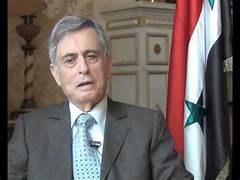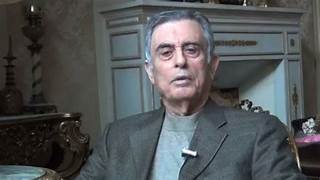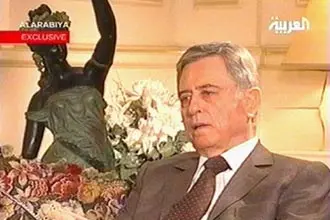“He was raised in a household where his father considered Syria his personal estate… and indeed, he has done worse than his father in several Syrian cities.
Cairo – DPA – Former deputy to the Syrian President, Abdel Haleem Khaddam, described President Bashar al-Assad as a “dictator who doesn’t learn from the experiences of his predecessors, many of whom were ousted by popular revolutions from their seats of power.”
This came in response to questions posed to him by the “German News Agency” in Cairo via email.
When asked if Bashar al-Assad learned from the experiences of his predecessors, especially since he is closer in age to the youth who are the makers of revolutions, Khaddam answered, “Bashar al-Assad is an arrogant dictator who is incapable of learning. He considers himself the master of knowledge and wisdom, and those around him have ingrained in him the notion that the people love him, despite his inability, due to his arrogance and psychological makeup, to distinguish between right and wrong.”
He added, “His young age doesn’t mean he is close to modernity and reform. He was raised in a household where his father considered himself the owner of Syria and that Syria is his farm, and that his father is infallible and that whatever his father says is the truth. Bashar al-Assad has indeed done worse than his father in Dar’a, Darya, Squba, al-Moadimiyeh, Douma, Damascus, Harasta, al-Zabadani, Homs, Jableh, Banias, Deir ez-Zor, and Hama. And we have a popular saying: ‘The son is the secret of his father.'”
Khaddam ruled out the possibility of “Hezbollah,” the strong ally of the Syrian regime, escalating military actions with Israel in the region in order to attract attention and relieve the international pressure on the Syrian regime. He explained, “I don’t believe that Hezbollah will engage in a war with Israel. It’s not in its interest to do so, and such a decision requires Iranian approval. The Iranian leadership understands that involving Hezbollah in these circumstances would lead to its downfall. Therefore, it doesn’t want to lose its most significant armed force outside its national borders.”
Khaddam emphasized that the statement made by businessman Rami Makhlouf, the president’s cousin, that there won’t be stability in Israel unless there is stability in Syria, “reveals the nature of the Syrian regime and its pursuit of its own interests only.” Khaddam questioned, “If indeed the stability of Israel is linked to the stability of Syria, why doesn’t Bashar al-Assad exert pressure on Israel to withdraw from the Golan Heights, especially since he possesses all this power? This statement indicates that the regime senses its impending end… Thus, they resort to empty slogans that don’t lead to anything in reality. However, they may think that some of these slogans could prolong the regime’s survival, but it is already doomed and will eventually fall.”
Khaddam ruled out Bashar al-Assad staging a coup against figures close to the ruling circles, such as Rami and Hafez Makhlouf, his cousin, as a corrective move, with Bashar placing the blame on them in an attempt to save himself and his rule. He said, “I don’t expect Bashar al-Assad to stage a coup against his brother, nor do I think that Maher will do so. And if tension arises between them, one of them will work to eliminate the other.”
Regarding the possibility of Maher al-Assad, or any figure close to the ruling circles, staging a coup against Bashar, with the support of Iran, which may attempt to keep its ally Syria by changing its external face, Khaddam said, “Maher al-Assad, as I mentioned earlier, will not stage a coup against his brother, and if he does, Iran will not support him. Iran is committed to supporting the regime… In addition to that, in Syria, there is no one who would accept any of the ruling family to remain without being held accountable. The Syrian people aspire to build a democratic civil state, not to continue under an authoritarian, corrupt, and all-encompassing rule.”
Many political analysts have presented a scenario where a figure close to the ruling circles would stage a coup against Bashar al-Assad, effectively maintaining power in Syria, but under a civil façade or Sunni leadership.
Khaddam denied the existence of divisions within the ruling family in Syria, emphasizing that “Bashar al-Assad is still considered the strongest figure in the family and the ruling circle.” He said, “The Assad family comprises two figures who make decisions: Bashar and Maher. The others are supporters and executors, but it’s no longer acceptable to talk about the possibility of the Assad family continuing in power and the persistence of an all-encompassing regime.”
He continued, “A regime that uses its army to suppress its citizens with tanks and artillery, causing more than two thousand deaths and thousands of injuries, and arrests citizens and terrorizes towns and villages, cannot endure. It has undoubtedly fallen. However, the manner of its downfall is tied to the course of events, and without a doubt, the Syrian people are determined to hold Bashar al-Assad and all those involved with him accountable.”
Responding to a question about the Syrian regime’s ability to withstand popular protests, especially given the continued loyalty of the army and other security apparatuses to it until now, and the fact that the protests themselves are not of the same intensity in all Syrian provinces, the former deputy to the Syrian President said, “After Hafez al-Assad took power, he rebuilt the armed forces and security apparatuses, opened the doors of military and security colleges to the majority of Alawite students and a small number of other Syrians. This was because he believed that the army and security were the guardians of the regime, thus the army and security apparatuses became the two primary instruments for maintaining power. As for saying that the protests are not of the same pace and intensity in all Syrian provinces, this is not accurate. It’s true that in some areas there are people who haven’t participated, not because they support the regime, but because they fear the bloody repression practiced by the regime.”
Khaddam rejected the claims that Syria is part of the “Axis of Resistance” and thus is now paying the price for its supportive stance towards the resistance movement by having its national security targeted. He emphasized that “the notion of resistance, steadfastness, and embracing the resistance, as I’ve said, are all false slogans that no one believes… A resilient state does not deprive its people of freedom, oppress them, loot their resources, or unjustly treat them. How can a state stand firm while its people are imprisoned and deprived of the most basic necessities of life, and the ruling family loots their wealth? As for attempts to target Syria… Syria is indeed targeted, not from abroad, but from the regime that suppresses its own people. The pretext of external conspiracy is false and no Syrian believes it.”
He continued, “The Syrian regime accused individuals within the Future Movement (Lebanese) of being behind what is happening, and this is not true. The Future Movement is submerged in accusations made by friends and allies of the Syrian regime. It doesn’t have the means or the ability to do that. Even its media outlets have taken a neutral stance towards the regime’s crimes. As for accusing Saudi figures, there is no truth to this, neither closely nor remotely. Syrians criticize Arab countries, including Saudi Arabia, for their silence about what is happening.”
Khaddam affirmed that “there is no chance for the Syrian regime to escape the scenario of its downfall, but this fall is tied to the evolution of events and to internal and external stances that may arise. It won’t be able to evade its fall through a roadmap or initiatives by neighboring countries, including Iran and Turkey. Iran, the regime’s ally, isn’t trustworthy. I believe that Turkey is coming closer to the realization that the regime is no longer qualified to continue. It’s inconceivable for Syrians to remain under the rule of a minority family that constitutes less than 8 percent of the country’s population, and this is not due to sectarian reasons, but rather due to the regime’s practices. When President Hafez al-Assad ran for the presidency in March 1971, people knew he belonged to the Alawite sect, but they didn’t expect him to adopt a sectarian approach.”
In response to the increasingly severe stances adopted by some Western countries, especially France, Britain, and Germany, towards the Syrian regime, Khaddam said, “We hope that this is a direction towards taking serious decisions and stances that isolate the regime and exert pressure on it.”
Regarding the extent of Syrians’ support for a military strike by the West against the regime in their country, similar to the situation in Libya, Khaddam answered, “It’s premature to talk about a military strike. Until now, the international community hasn’t reached a stage of imposing serious sanctions on the Syrian regime. If you want to understand the real criterion, imagine a people being killed by their own army, which is supposed to protect them. What can they ask for or say about such a situation?”
He continued, “In Libya, the rebels didn’t seek international support until they realized that without it, Libyans would be crushed. They clearly requested it. This doesn’t mean subservience to the West or the East, and it doesn’t mean inviting interference in zones of influence. As a principle, Syrians don’t desire external military intervention, but from my perspective, the regime in Syria is no longer a national regime, and it has lost its legitimacy. It’s now an occupying force supported by a foreign state called Iran. If the international community fails to impose severe sanctions against the regime and Bashar al-Assad, then all possibilities become legitimate for Syrians.”
He clarified, “If the international community continues to remain silent and takes no action, the region will witness a dangerous development. Oppression, injustice, and persecution lead to despair, and despair leads to extremism. At that point, no one in the region will remain without feeling anxious.”
The European Union recently released a list of 13 Syrian officials subject to sanctions, including Maher al-Assad, Rami Makhlouf, and the head of intelligence, Ali Mamlouk.
Khaddam emphasized his intention to return to Syria after the downfall of the Bashar al-Assad regime, downplaying the possibility of anyone demanding his trial at that point.
He said, “Yes, I was a prominent figure in the regime, but in its foreign policies. No one can judge me except based on what I was involved in. I left the regime, and that was like a severe blow to it. Even my name became frightening. Many media outlets, both influenced and not influenced by the regime, were afraid to mention my name so as not to face repercussions from the regime.”



